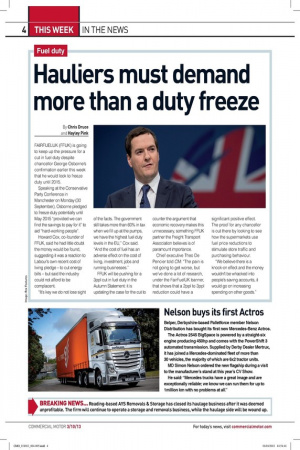Hauliers must demand more than a duty freeze
Page 3

If you've noticed an error in this article please click here to report it so we can fix it.
By Chris Druce and Hayley Pink
FAIRFUELUK (FFUK) is going to keep up the pressure for a cut in fuel duty despite chancellor George Osborne's confirmation earlier this week that he would look to freeze duty until 2015.
Speaking at the Conservative Party Conference in Manchester on Monday (30 September), Osborne pledged to freeze duty potentially until May 2015 "provided we can find the savings to pay for it" to aid "hard-working people".
Howard Cox, co-founder of FFUK, said he had little doubt the money would be found, suggesting it was a reaction to Labour's own recent cost of living pledge — to cut energy bills — but said the industry could not afford to be complacent. "Its key we do not lose sight
of the facts. The government still takes more than 60% in tax when we fill up at the pumps, we have the highest fuel duty levels in the EU," Cox said. "And the cost of fuel has an adverse effect on the cost of living, investment, jobs and running businesses." FFUK will be pushing for a 3ppl cut in fuel duty in the Autumn Statement: it is updating the case for the cut to
counter the argument that economic recovery makes this unnecessary, something FFUK partner the Freight Transport Association believes is of paramount importance. Chief executive Theo De Pencier told CM: "The pain is not going to get worse, but we've done a lot of research, under the FairFuelUK banner, that shows that a 2ppl to 3ppl reduction could have a
significant positive effect. The proof for any chancellor is out there by looking to see how the supermarkets use fuel price reductions to stimulate store traffic and purchasing behaviour.
"We believe there is a knock-on effect and the money wouldn't be whacked into people's saving accounts, it would go on increasing spending on other goods."











































